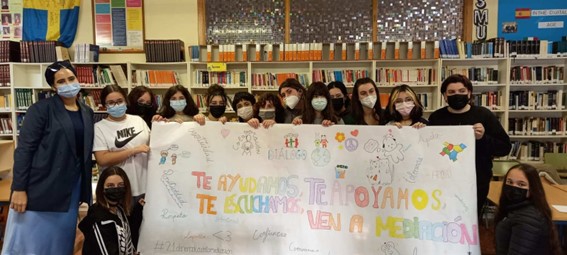Not so long ago, non-violence and peace were commemorated in educational centers, solidarity, harmony, respect for Human Rights, where They are committed as defenders of peace and understanding between people of different origins and ways of thinking.
If we analyze educational centers, we find a microsystem that reproduces the problems and social realities of the environment in which they are framed. It is the students themselves who propose having conflicts with their classmates to whom they do not always know how to solve them, despite wanting to do so. Insults, misunderstandings or physical attacks are small confrontations that occur in the classrooms, hallways or courtyards of educational centers. Wanting these to disappear is useless, since conflict is inherent to the person, so we will always encounter situations in which the different positions of those involved will need the help of someone prepared to guide them in the search for solutions. the solution to your problem.
Mediation offers educational centers one more tool to use to solve problems that arise in the educational community. Mainly with the students, but also opening the door to teachers and parents who want to sign up for this adventure. Dialogue, assertiveness, solidarity or empathy are words that begin to make sense in those students who want to be part of the team of school mediators, to the point of transmitting it and infecting their classmates.

Conflict is part of people, but we are also capable of responding to it in a peaceful and dialogued manner. Now, how do we learn to do it? Is it an innate gift in the person?
Obviously the answer is that no, we do not always find a way to give a peaceful response to the conflicts that occur to us because, when emotions come into play, we can get carried away by feelings that, if not well channeled, will give rise to aggressive responses, violent, evasive, and, ultimately, little or not at all suitable for facing conflict as an opportunity for growth.
At school, relationships are established with peers, but also with authority figures such as teachers, professors and parents of other students at school. It is in the educational field where the values that we learn in the family are lived and reinforced. We reproduce everything that we have been taught up to that point, but we also have the ability to continue learning.

For this reason, the school is a socializing agent that is presented to us as a microsystem that reflects the society in which we live, although in a more controlled and safe way. It is our social training ground, where we learn that life is also a relationship and that we will not always find peaceful relationships. In the educational field, students must learn to manage their conflicts, and it is the task of the educational community to teach children to do so in the best possible way. From this learning will be derived, in large part, how those who in a few years will be full adults in society will act.
The classroom or the playground of a school are settings where all this is learned and where members of a society can be forged who use dialogue as a tool to manage conflicts, leaving aside coercion, threats or aggression.
On the other hand, as students grow and enter adolescence, there are also differences between teachers and students that are not always resolved in a satisfactory manner for both parties. Sometimes it is the parents who intervene in the conflicts that occur at the center, confronting them with the teachers or other parents. For this reason, the existence of a communication space is essential where the parties involved are able, through dialogue, to explain what the problem is and be able to find a solution that satisfies all those involved.
Since these communication skills are not innate, it is necessary to create a group of school mediators who can help the parties sit down, talk and manage their conflicts in an appropriate way.
Childhood and adolescence is a topic that, unfortunately, has recently occupied many covers and news and, not always happy...
Let us work from the base so that our minors develop all their skills and abilities with the assurance that their rights will be respected and with the firm conviction that we have made progress, but we still have a lot to do...and this is the way.




